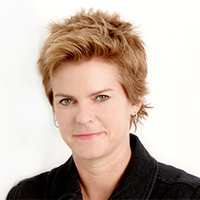The New Retirement Reality for Women
A woman's road to retirement has a few extra hurdles. To successfully jump them, they may want to rethink what retirement means in today's world.


Profit and prosper with the best of Kiplinger's advice on investing, taxes, retirement, personal finance and much more. Delivered daily. Enter your email in the box and click Sign Me Up.
You are now subscribed
Your newsletter sign-up was successful
Want to add more newsletters?

Delivered daily
Kiplinger Today
Profit and prosper with the best of Kiplinger's advice on investing, taxes, retirement, personal finance and much more delivered daily. Smart money moves start here.

Sent five days a week
Kiplinger A Step Ahead
Get practical help to make better financial decisions in your everyday life, from spending to savings on top deals.

Delivered daily
Kiplinger Closing Bell
Get today's biggest financial and investing headlines delivered to your inbox every day the U.S. stock market is open.

Sent twice a week
Kiplinger Adviser Intel
Financial pros across the country share best practices and fresh tactics to preserve and grow your wealth.

Delivered weekly
Kiplinger Tax Tips
Trim your federal and state tax bills with practical tax-planning and tax-cutting strategies.

Sent twice a week
Kiplinger Retirement Tips
Your twice-a-week guide to planning and enjoying a financially secure and richly rewarding retirement

Sent bimonthly.
Kiplinger Adviser Angle
Insights for advisers, wealth managers and other financial professionals.

Sent twice a week
Kiplinger Investing Weekly
Your twice-a-week roundup of promising stocks, funds, companies and industries you should consider, ones you should avoid, and why.

Sent weekly for six weeks
Kiplinger Invest for Retirement
Your step-by-step six-part series on how to invest for retirement, from devising a successful strategy to exactly which investments to choose.
By the year 2030, women will control as much as two-thirds of the nation’s wealth, experts estimate. Currently, women control $11.2 trillion (39%) of investable assets in the United States, according to the Center for Talent Innovation.
Although this financial progress is compelling, as women, we continue to face uphill financial challenges. This is especially true when it comes to preparing for retirement. Not only do women live longer, but we also need to save more for retirement.
Unique Challenges Face Women Moving Toward Retirement
Women earn less during their working years than their male counterparts, to the tune of 80%, meaning that on average women make 80 cents for every dollar paid to men, according to the National Partnership for Women and Families. We also tend to work fewer total years than men to take time off for family matters and caregiving.
From just $107.88 $24.99 for Kiplinger Personal Finance
Become a smarter, better informed investor. Subscribe from just $107.88 $24.99, plus get up to 4 Special Issues

Sign up for Kiplinger’s Free Newsletters
Profit and prosper with the best of expert advice on investing, taxes, retirement, personal finance and more - straight to your e-mail.
Profit and prosper with the best of expert advice - straight to your e-mail.
This “gender gap” equates to women saving significantly less for retirement than our male counterparts. It also means that women will likely receive less in government benefits like Social Security, which is based on income earned during our working years.
At the same time, we are living longer. According to the Social Security Administration, a 65-year-old woman today has a life expectancy of 87, versus 84 for a man of the same age. This longer life expectancy results in higher overall health care costs and the need for our retirement funds to last longer.
According to HealthView Services, women need to set aside at least 20% more to cover their medical bills in the final years of their lives.
The Balancing Act
Many working women — busy balancing family, career and other personal endeavors — tend to put retirement planning on the back burner, taking a passive approach to establishing realistic goals and working toward them.
This also means women are guessing at when they can retire, how much money they will need and how long their retirement funds might last. As women go through the retirement-planning process, they may be surprised by this retirement “disconnect.” Many learn that their expectations about retirement are inaccurate.
Even with these impending retirement shortfalls, working women are still eager to retire comfortably, and many hope to retire early. To meet these goals, delaying retirement by a few years or working at least part-time during retirement may prove to be a better option.
How Women Can Thrive in the New Retirement Reality
The good news is that the concept of retirement is changing. Rather than your retirement being an end-of-life phase, it can be a new beginning. There is a new retirement reality at play because of the challenges you face, but also because of the opportunities that living a longer life can bring, assuming that you stay healthy.
It may be time to rethink your retirement vision. Consider that if you were to retire early at 55, for example, you could potentially live another 30+ years. This is a very long time to be retired without any working activity or earned income.
Reinvention in retirement
Your retirement years can certainly include recreation and relaxation, but they can also be a wonderful time for reinvention! You may be able to retire from one career and begin a new career path altogether.
Some women are going back to school to earn a new or advanced degree in a different field or industry. I have one friend who retired from teaching and went to law school in her mid-50s. I have another who did the opposite: She retired early as a lawyer and went into teaching.
I know other women who established consulting practices after retiring from a long-term career where they have been able to leverage their knowledge and years of experience to build their own client base.
There are many opportunities to reinvent yourself based on your knowledge, skills, experience and interests. Ask yourself, “What have I always wanted to do?”
Consider a mini-retirement
Maybe you have a very demanding career and you are burned out. Perhaps you just can’t see yourself continuing on that same path beyond the next few years. Or, maybe you just need a break and some time to think about what you really want to do with the rest of your life. This is when a mini-retirement may come in handy.
A mini-retirement is similar to a sabbatical where you take some time off to explore your passions, interests and future work opportunities. If you work for someone else, it’s possible that your company would let you take an extended leave. You never know unless you ask.
I took a mini-retirement at age 40 when I left my 15-year career with a large financial institution. During this time, I explored what my most important values were and also had the opportunity to pursue one of my hobbies, performing as a singer-songwriter and recording artist. It was a wonderful time of soul-searching. After a year or so, I set up my own consulting practice and eventually returned to my career as a financial adviser, but this time on my own terms. I discovered that I still loved what I did; I just didn’t love the stuffy corporate environment I had been working in for so many years.
Only time away during my mini-retirement allowed me to uncover how I truly felt about my work and how to make the career work better for me.
What is Your Retirement Vision?
Regardless of how you decide to live out your years in the retirement life phase, creating your retirement vision requires your attention and intention. You don’t want to leave this to chance. It’s too important.
You will want to become more purposeful about the retirement vision you have for yourself and commit to doing what it takes now and in the future to prepare. Do you need to start acquiring new skills or building out your network? Talk to other women who have gone before you or who are doing what you’d like to be doing someday and ask their advice.
The earlier in your career that you become more purposeful about your retirement vision, the more time you have to make up for the “gender gap” and plan for your longevity.
Most importantly, believe in your ability to reinvent yourself and create the life you want beyond age 50. Embrace the idea of continuing to be active and engaged for as long as you live!
Profit and prosper with the best of Kiplinger's advice on investing, taxes, retirement, personal finance and much more. Delivered daily. Enter your email in the box and click Sign Me Up.

Stephanie Sammons is a Certified Financial Planner™ with more than 20 years of experience in helping professional women create and achieve their ideal retirement lifestyle plan.
Sammons Wealth Management is an independent, fee-only financial firm based in Dallas, Texas, and serving women nationwide. We build retirement lifestyle plans and manage wealth for professional women who are moving toward the retirement phase of their lives.
-
 Dow Adds 1,206 Points to Top 50,000: Stock Market Today
Dow Adds 1,206 Points to Top 50,000: Stock Market TodayThe S&P 500 and Nasdaq also had strong finishes to a volatile week, with beaten-down tech stocks outperforming.
-
 Ask the Tax Editor: Federal Income Tax Deductions
Ask the Tax Editor: Federal Income Tax DeductionsAsk the Editor In this week's Ask the Editor Q&A, Joy Taylor answers questions on federal income tax deductions
-
 States With No-Fault Car Insurance Laws (and How No-Fault Car Insurance Works)
States With No-Fault Car Insurance Laws (and How No-Fault Car Insurance Works)A breakdown of the confusing rules around no-fault car insurance in every state where it exists.
-
 For the 2% Club, the Guardrails Approach and the 4% Rule Do Not Work: Here's What Works Instead
For the 2% Club, the Guardrails Approach and the 4% Rule Do Not Work: Here's What Works InsteadFor retirees with a pension, traditional withdrawal rules could be too restrictive. You need a tailored income plan that is much more flexible and realistic.
-
 Retiring Next Year? Now Is the Time to Start Designing What Your Retirement Will Look Like
Retiring Next Year? Now Is the Time to Start Designing What Your Retirement Will Look LikeThis is when you should be shifting your focus from growing your portfolio to designing an income and tax strategy that aligns your resources with your purpose.
-
 I'm a Financial Planner: This Layered Approach for Your Retirement Money Can Help Lower Your Stress
I'm a Financial Planner: This Layered Approach for Your Retirement Money Can Help Lower Your StressTo be confident about retirement, consider building a safety net by dividing assets into distinct layers and establishing a regular review process. Here's how.
-
 The 4 Estate Planning Documents Every High-Net-Worth Family Needs (Not Just a Will)
The 4 Estate Planning Documents Every High-Net-Worth Family Needs (Not Just a Will)The key to successful estate planning for HNW families isn't just drafting these four documents, but ensuring they're current and immediately accessible.
-
 Love and Legacy: What Couples Rarely Talk About (But Should)
Love and Legacy: What Couples Rarely Talk About (But Should)Couples who talk openly about finances, including estate planning, are more likely to head into retirement joyfully. How can you get the conversation going?
-
 How to Get the Fair Value for Your Shares When You Are in the Minority Vote on a Sale of Substantially All Corporate Assets
How to Get the Fair Value for Your Shares When You Are in the Minority Vote on a Sale of Substantially All Corporate AssetsWhen a sale of substantially all corporate assets is approved by majority vote, shareholders on the losing side of the vote should understand their rights.
-
 How to Add a Pet Trust to Your Estate Plan: Don't Leave Your Best Friend to Chance
How to Add a Pet Trust to Your Estate Plan: Don't Leave Your Best Friend to ChanceAdding a pet trust to your estate plan can ensure your pets are properly looked after when you're no longer able to care for them. This is how to go about it.
-
 Want to Avoid Leaving Chaos in Your Wake? Don't Leave Behind an Outdated Estate Plan
Want to Avoid Leaving Chaos in Your Wake? Don't Leave Behind an Outdated Estate PlanAn outdated or incomplete estate plan could cause confusion for those handling your affairs at a difficult time. This guide highlights what to update and when.